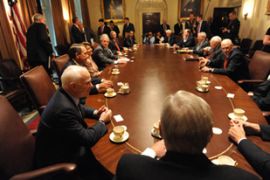US bail-out deal remains elusive
Democrats blame McCain for causing “distraction” and floating 11th hour alternative plan.

But that was before a White House meeting later in the day where George Bush, the US president, met presidential candidates Barack Obama and John McCain, along with congressional leaders.
When it was clear there was no agreement and that the plan could still face some obstacles, stock futures weakened after the close of trading, signalling a lower open on Friday.
Bush had told reporters before the meeting that “we’re in a serious economic crisis in the country if we don’t pass a piece of legislation”, adding that he hoped to reach a deal “very shortly”.
But there was no agreement at the meeting and it appeared that the process had instead taken a step backwards.
McCain blamed
Senior Democrats put the blame squarely on McCain, saying his decision to endorse a new Republican plan that differs markedly from the one that had been under deliberation for about a week, threw the process into disarray.
| Alternative plan |
|
|
Democrats said McCain floated an alternative mortgage insurance plan but could not explain it properly.
They also said his decision to “suspend” his campaign and insert himself in the bail-out talks caused a distraction and contributed nothing constructive.
McCain, trailing Obama in opinion polls, especially in the area of handling the economy, had appeared to get the jump on his rival on Wednesday, announcing that he was suspending his campaign to return to Washington to help sort out the country’s financial mess.
But Dodd called Thursday’s White House meeting “political theatre” that looked like “a rescue plan for John McCain for two hours”, adding that it had been a “distraction” to negotiations that had been making progress.
Harry Reid, the senate majority leader, said he believed Democrats and Republicans had been moving towards a deal and that McCain only got in the way.
“John McCain did nothing to help, he only hurt the process,” Reid said. “If we lose progress it is only because of one person – that is John McCain standing in the way.”
He added that “we don’t need presidential politics involved in this”.
Obama, who had appeared caught by surprise by McCain’s decision on Wednesday to travel back to Washington, told a press conference after the White House talks that his concern was that “when you start injecting presidential politics into delicate negotiations, then you can actually create more problems”.
Allen Boyd, Democratic congressman, said McCain “has come in and tried to play the hero” while fellow Democrat Brad Sherman said “McCain and the Republican caucus are blocking this bill”.
Al Jazeera’s senior Washington correspondent, Rob Reynolds, said it did appear as if the injection of presidential politics had had an adverse effect on the delicate process of negotiations to come up with a deal.
He added that McCain was in a very tricky situation and had to choose between angering his party’s hardcore conservatives who frown on the bail-out plan as a socialist policy, and possibly alienating the electorate if he is seen as a captive of this ideologically-drive group and seen to be standing in the way of a deal that could save the US economy.
Debate still uncertain
But McCain himself was upbeat that legislators were on track for a deal and Steve Schmidt, one of his senior advisers, said it was Reid who had said McCain’s help was needed to help corral Republican support for the plan.
McCain also said he was “very hopeful that we’ll have enough of an agreement tomorrow [Friday] that I can get to” a televised debate with Obama on Friday night in Mississippi.
McCain had on Wednesday urged Obama to postpone the debate – the first of three that may prove pivotal in the November 4 election – a call the Democratic candidate rejected.
Meanwhile on Thursday, while the CFA Institute released results of a survey of 3,200 investment professionals indicating that two thirds thought the government’s bail-out plan was the best solution to the economic crisis, hundreds of labour unionists protested against the plan near the New York Stock Exchange.
“We want our tax dollars used to provide a hand up for the millions of working people who live on Main Street and not a handout to a privileged band of overpaid executives,” union leaders said.
